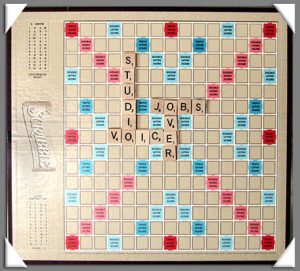When people find out that I’m a voice talent, they often ask me to “do a voice”. They seem disappointed when I respond “you’re pretty much hearing it now.” Many people expect all voice-over professionals to record zany voices for cartoons and movies. They often don’t realize that voice actors are also the people who record the radio and TV commercials, audiobooks, documentaries, training programs, games and phone systems.
While practice is necessary for proficiency, much of any kind of voice-over work depends on your mental state when performing. The eyes may be the window to the soul, but the voice is the door to one’s emotions. Whatever you are thinking and feeling is instantly heard in your voice. For instance, I’m sure people have said to you things like “you sound tired” or “is something wrong?”. Your voice mirrors your thoughts and emotions.
Much of my voice-over work is in corporate narrations and training programs. Recently, one of my contacts, an educational specialist who is producing and narrating some internal training programs for his company, asked me how not to sound like he was reading a eulogy at a funeral. I gave him the list of 12 tips show below, listed in no particular order. I thought others may find them helpful in making your narrations more natural and conversational.
1) Don’t rush the words. We tend to rush if we think we are running out of time or when we start thinking that people aren’t interested in our topic. This inner stress will be heard in the voice. Narrations usually are not rigidly time-sensitive like a commercial, so you really DO have plenty of time!
2) Articulation and diction are essential to properly convey the message. A voice-over narration should be transparent to the listener. You want the audience to be concentrating on your message and not distracted by the manner in which you are presenting it. Over-enunciation can be as distracting as sloppy enunciation.
3) Speak at your normal pitch. If you change your pitch because you don’t like the sound of your voice or think that people want to hear something else, you are not being authentic to yourself. The recording suffers because you are concentrating on the sound of your own voice rather than the message that you intend to convey.
4) If you need more energy, stand up while recording. I sit when recording long narrations. When doing so, the key to maintaining energy is to sit up straight and not let your chin dip down toward your chest.
5) A smile adds warmth to any word, but a smile throughout the piece could sound forced and inauthentic. The sound of a constant smile erodes our trust in the spokesperson. Think of the used car salesman that we all try avoid — “friends, have I got a DEAL for you!” 🙂
6) Stay hydrated; drink plenty of water before, during and after the voice-over session. As you speak, you are expelling saliva. A dry mouth is frustrating when performing a voice-over but actually could be the starting point for a number of more serious health problems.
7) In your mind, picture one person to whom you are presenting this information. This shouldn’t be a random person but instead should be someone who would actually be interested in obtaining the information you are providing. As you perform the script, speak as if you are having a quiet conversation with that person. If your volume is too loud, it shows that you aren’t aware of your context. The images should have the starring role, with the narration blending as a supporting player.
8) Practice the text out loud prior to recording. Mark the script with words to emphasize and places to pause.
9) Read using chunks of phrases. You usually can mentally read several lines ahead of the point where you are speaking. By paying attention to your phrasing, you won’t sound like you read to the end of a line and paused at an inopportune moment to send your eyes down to the next line. I’m reminded of old typewriters when I hear this type of narration, and I instantly stop listening to the message because the veil of transparency was dropped.
10) Breathe from your diaphragm and not your chest. Chest-breathing is more shallow, so you cannot get enough air to sustain you through longer passages. Better breathing also makes your voice sound fuller and richer.
11) Don’t let your pitch drop at the ends of sentences. It can sound rushed or that you are not interested. In either case, your listeners will detect the change and again would not be thinking about the message.
12) Relax! If you are holding tension anywhere in your body, it will be heard in your voice. Totally lose yourself in the words in the script, and let them be your only point of thought while producing your recording.
While I mostly record narrations, I love to perform character voices. I look forward to the day when someone wants to hear one of my voices, and I demonstrate something as famous as Nancy Cartwright voicing Bart Simpson! 🙂
